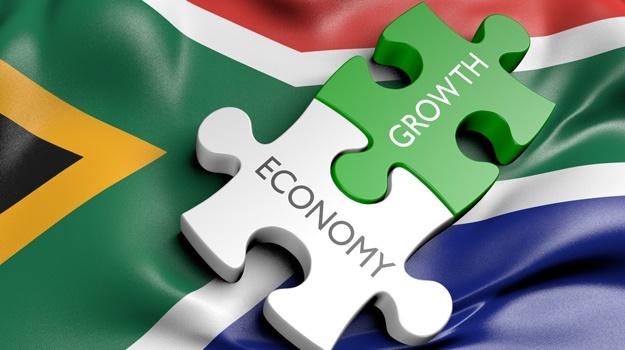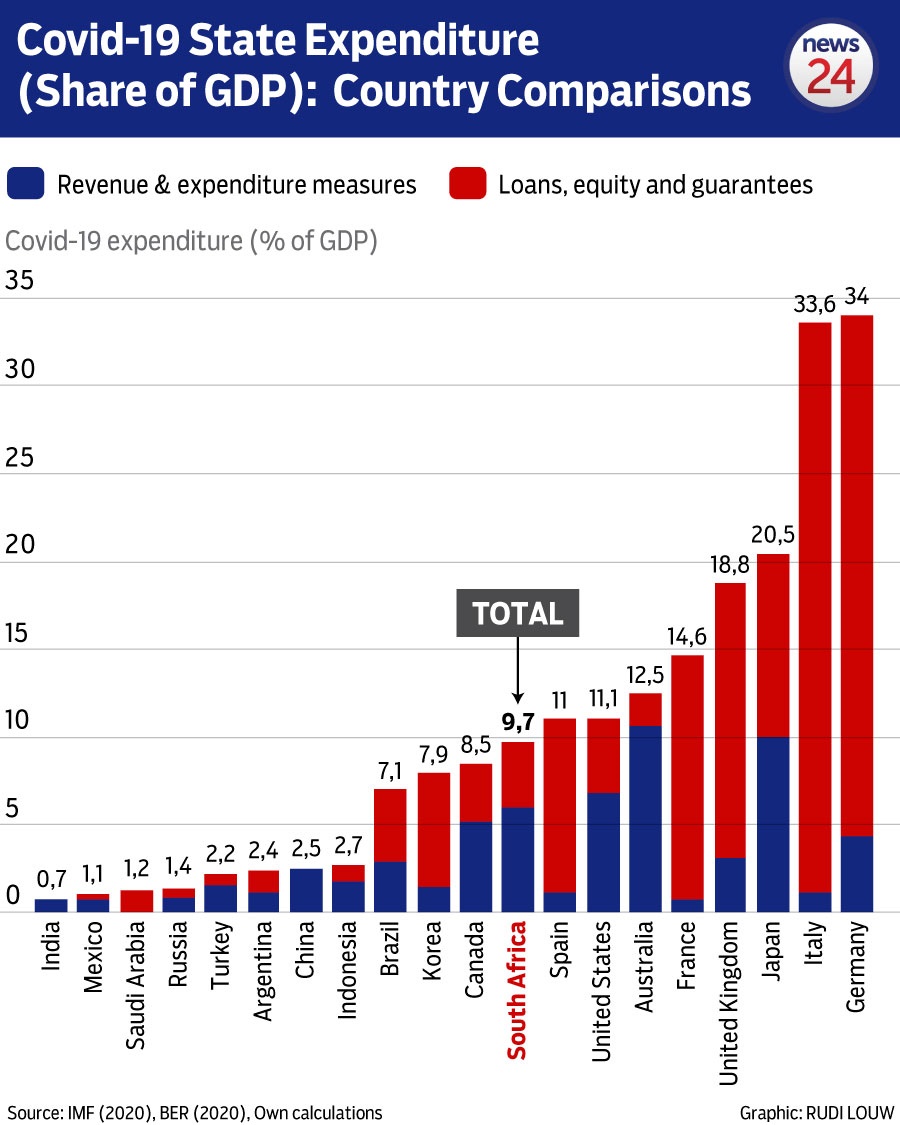
Ultimately, there are no easy solutions to reigniting a Covid-19 affected economy. It is evident however that addressing the public health crisis is non-negotiable, writes Haroon Bhorat.
In the current environment, it is safe to argue that there is a surfeit of information on Covid-19.
So, in trying to battle for space in your day, an attempt will be made to distill what are currently the five key facts required for understanding the economics of Covid-19 for South Africa.
Fact 1: We are not doing badly
The Covid-19 infection data suggests that South Africa's trends - to paraphrase the incomparable Professor Salim Abdool Karim - are unconventional relative to comparator economies.
Indeed, at the same stage of the epidemic, South Africa had the lowest number of confirmed cases relative to the UK, US, Brazil and India.
This positive pattern may be explained in part, by both an early and strict lockdown. Yes - the intensity and timing of the lockdown also mattered!
In addition, the containment of imported cases primarily among high income earners and tourists, served to flatten the curve.
However, we should not be lulled into a false sense of security. All the expert evidence indicates that we are on a "delayed exponential infection curve".
That is just a fancy way of saying that Covid-19 infections will increase dramatically as the economy gradually opens and we shift into more widespread community transmission.
What we have done though, is hopefully both to lower the absolute number of infections and deaths over time (flattened the curve) than would have occurred without the lockdown measures.

A positive result for Covid-19. (iStock/Gallo Images)
A second reason to be optimistic - again alluded to by Professor Karim - is that South Africa is in the unique situation of having a large number of community healthcare workers (CHWs).
These CHWs play a crucial role in the fight against HIV and TB through screening, prevention, treatment adherence and health promotion.
These healthcare workers are spread across South Africa and can now serve as our first line of defence - our first responders as it were - against Covid-19 in order to educate, screen, and refer for testing at the household level.
The role that CHWs play as cadres who can be redeployed in the battle against Covid-19, is a key advantage we have in fighting this pandemic.
Fact 2: Growth crash followed by recovery
Despite these two early Covid-19 advantages, the economic fallout from the lockdown has been deep and ferocious.
The prevention initially of all but essential forms of economic activity - has laid bare the vulnerable forms of livelihood strategies undertaken by the majority of South Africans.
Put differently: it took all of three weeks from the first day of lockdown for widespread food insecurity to give rise to legitimate anger and protests in South Africa.
Economic growth is projected to decline by 7% for the year.
To put the scale of this economic collapse into context: this would be the biggest contraction in the South African economy since 1960 – and, in turn, is 4.5 times larger than the contraction experienced in the aftermath of the Great Recession in 2009.
In that recession we lost over a million jobs, and although we do not have firm numbers yet - it would not be a surprise if the economy shed at least the same number of jobs.
However, whilst we are looking at a massive crash in 2020, there is positive hope for 2021: these same growth models also project a strong bounce-back.
No less than the IMF, has a growth recovery of 4.1% for 2021.
Fact 3: A Covid-19 support package
The state though, in quickly recognising the scale of this socio-economic destruction, announced a massive stimulus package.
The empirics of the stimulus package again speak to a highly responsive government, at least in terms of scale and commitment. How big is it?
The package, although definition dependent, stands at about R502 billion.
When you exclude reprioritisation - another fancy word meaning shifting from one budget line item to another - the actual stimulus is about R328 billion.
This package includes a massive injection into social assistance as well as a national wage subsidy programme.
Before you sniff at the value of the stimulus, note the following: this stands at about 10% of GDP, which ensures that South Africa's Covid-19 stimulus package is higher as a share of GDP, than that spent by Canada, Brazil and South Korea.
In addition, we yield the highest relative spending on Covid-19 among other emerging markets in the world, including China and India.
Fact 4: The new Covid-19 workplace
The pressure really now is on the cluster of economic ministries to navigate a course that would simultaneously allow economic activity to be opened up, whilst also ensuring that this does not unduly fuel the rise in infections.
This is a delicate balancing act, for which there are no prior rules to guide policymakers.
There are two key elements required to thread the needle through an appropriate lockdown whilst optimally maintaining the growth of infections.
Firstly, there is a key requirement that both relevant areas of expertise within government and the private sector - namely health and economics - work intricately and directly together.
This is more than just governance-speak.
Let me explain: suppose that the new health data suggests a massive spike in a particular region or indeed sector, given the lockdown phase we are in.
This information, if instantaneously shared with the economic cluster - would allow for a quicker set of decisions around which sectors, or indeed even firms or regions - could be switched to a higher lockdown threshold.
This type of close interaction where a health-economics cluster approach is being pursued - needs to be intensified.
Secondly, there is a strong need to adopt a framework in the lockdown phasing which is related to key factors about sectors: the ability to work from home and the amount of physical interface required whilst at or travelling to work.
Current phases in the lockdown framework are not ostensibly related to these factors.
Data allows us to code sectors in this way – and this coding of sectors could potentially guide, and inform, the phasing of lockdowns - in concert with the evolution of infections data.
Ultimately, the use of too stringent criteria to try and overmanage the exit from lockdown would not seem in any manner to either benefit the economy, nor serve as an appropriate Covid-19 public health response.
Fact 5: The deficit hangover
Lest we forget that the largest stimulus package in South Africa' history - will also result in the largest deficit-to-GDP levels this country has ever seen.
Recall that not only will we be required to find funds for the stimulus package (and pay it back literally with interest) - but also that tax revenue and GDP will of course decline sharply in 2020.
What are some of the projected numbers then?
If we assume no change in tax revenue, the deficit to GDP ratio will rise to about 13.5%.
If revenue falls by 15% - a most reasonable estimate - the deficit: GDP ratio is projected to rise to 19%. We are effectively either going to be doubling or close to tripling our deficit levels.
It is for this reason that, as the National Treasury emphasises, accessing cheap debt is a key ingredient for managing the fiscus.
Ultimately though, there are no easy solutions to reigniting a Covid-19-affected economy. It is evident, however, that addressing the public health crisis is non-negotiable.
Simultaneously, though the role played by social assistance and the protection of jobs remains a critical all-inclusive response to the pandemic.
In the immediate term though, a clear economically sensible lockdown phasing together with a deficit reduction plan is central to this economy’s growth prospects.
- Haroon Bhorat is a professor of economics, and director of the Development Policy Research Unit and the University of Cape Town. He is one of the country's foremost experts on inequality and poverty.




 Publications
Publications
 Partners
Partners
























